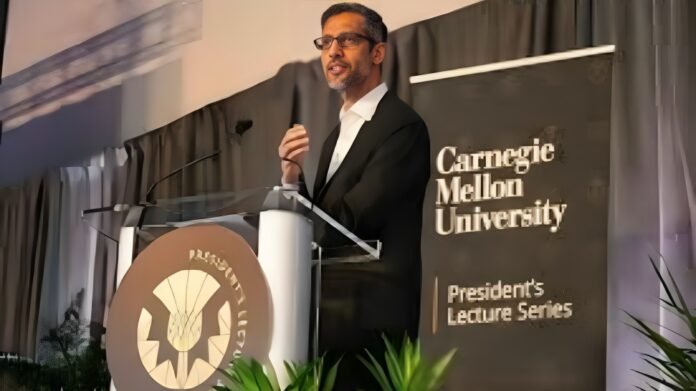On September 18, 2024, Sundar Pichai, the CEO of Alphabet and Google, delivered a speech at Carnegie Mellon University. He presented his notion for the future of AI during the very first talk of the session of the President’s Lecture Series of 2024-25. The title of his talk was “The AI Platform Shift and the Opportunity Ahead.” It was clear from his speech that technology and perhaps even human development would radically change thanks to AI.
The Role of AI in Human Creativity and Growth Sundar Pichai
According to Pichai, people will no longer need to spend their time on such boring work that is not creative. And will instead be more productive. And creators will only do more creative work as AI keeps on taking away the hard and dull tasks. He also claimed that AI would turn out to be an “even more natural extension [sic.] of human self”. Where the barriers that hinder technology use would be lowered. Pichai pointed out the changing business environment. Where it is now financially cheaper to utilize AI, stating, “What used to cost 4 dollars per million tokens now costs 13 cents. This tendency is going to hold.”
Innovative AI Models of Google: Gemini and Project Astra Sundar Pichai
Among them, Pichai noted one more particular to Google AI applications. It was Gemini, a large language model processor with the longest context out of every model, with two million tokens. Gemini also features multi-modal capabilities and advanced iPad compatibility right out of the box. Pichai then focused on Project Astra, an AI agent developed by Google DeepMind that specializes in spatial-centric applications. He described how AI supports end users in real-world scenarios.
Mitigating AI-related risks SynthID and Sustainability
For Google, the safety of artificial intelligence is a foremost concern. Pichai mentioned SynthID, which is related to synthetic content identification and is the company’s attempt at eliminating misinformation on the internet. He also mentioned some of Google’s ambitions on sustainability, exclaiming that most of the data centers run on carbon-free energy of up to 90%. He was hopeful that the consumers of AI technology would one day assist in overcoming the problem of excess energy consumption, especially with the help of small modular reactors in nuclear power generation.
Engaging with Societal Impact and Responsibilities of AI Development
Pichai looked to the future of AI and the risk of mass unemployment most forebrawed with the advent of new technologies. But at the same time, he stressed, such opportunities present themselves now and not afterward when all the wrongs have been done. The only person who seems to facilitate such transition allowance out to has no way of a certain virtue, optimistically predicts runaway destruction is so much as a tool available. This allows destruction is herself to occur equally, at least in preference rather than democratic processes.
Straight talk to students and academic challenges
Pichai encouraged students of Carnegie Mellon to welcome challenges and uncomfortable positions because it’s through their seeking that growth would be realized. Furthermore, he encouraged them to tackle challenges where there is doubt of their success because whatever the outcome, growth will emerge.
Overall Understanding
Pichai’s speech highlighted the undeniable potential of AI systems while recalling the associated risks that pose serious threats to humanity. As well as the necessary safety measures. And human progress required to handle such threats.


